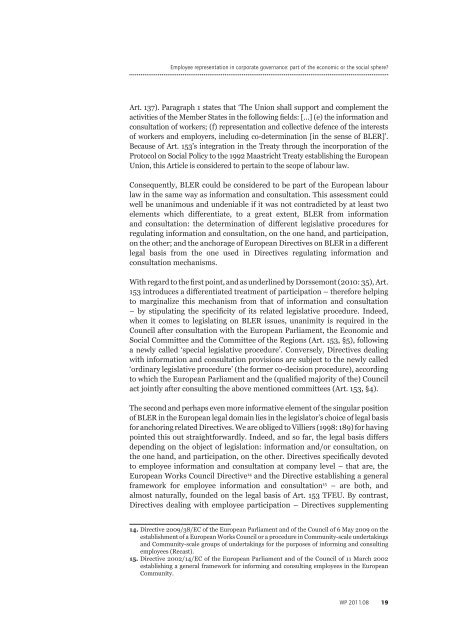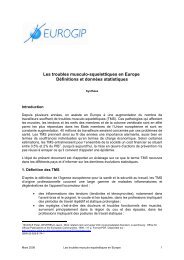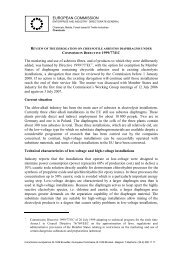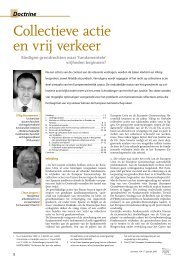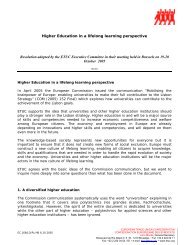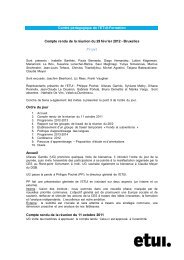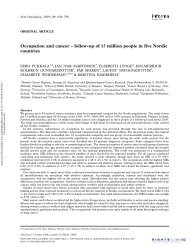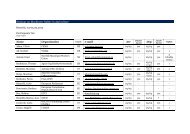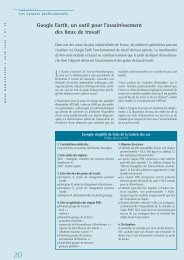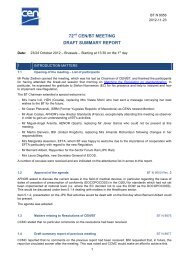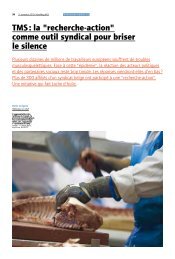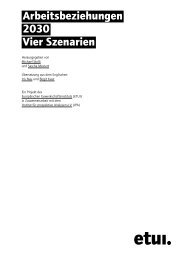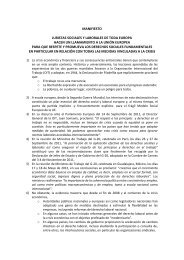Full text - European Trade Union Institute (ETUI)
Full text - European Trade Union Institute (ETUI)
Full text - European Trade Union Institute (ETUI)
You also want an ePaper? Increase the reach of your titles
YUMPU automatically turns print PDFs into web optimized ePapers that Google loves.
Employee representation in corporate governance: part of the economic or the social sphere?<br />
Art. 137). Paragraph 1 states that ‘The <strong>Union</strong> shall support and complement the<br />
activities of the Member States in the following fields: […] (e) the information and<br />
consultation of workers; (f) representation and collective defence of the interests<br />
of workers and employers, including co-determination [in the sense of BLER]’.<br />
Because of Art. 153’s integration in the Treaty through the incorporation of the<br />
Protocol on Social Policy to the 1992 Maastricht Treaty establishing the <strong>European</strong><br />
<strong>Union</strong>, this Article is considered to pertain to the scope of labour law.<br />
Consequently, BLER could be considered to be part of the <strong>European</strong> labour<br />
law in the same way as information and consultation. This assessment could<br />
well be unanimous and undeniable if it was not contradicted by at least two<br />
elements which differentiate, to a great extent, BLER from information<br />
and consultation: the determination of different legislative procedures for<br />
regulating information and consultation, on the one hand, and participation,<br />
on the other; and the anchorage of <strong>European</strong> Directives on BLER in a different<br />
legal basis from the one used in Directives regulating information and<br />
consultation mechanisms.<br />
With regard to the first point, and as underlined by Dorssemont (2010: 35), Art.<br />
153 introduces a differentiated treatment of participation – therefore helping<br />
to marginalize this mechanism from that of information and consultation<br />
– by stipulating the specificity of its related legislative procedure. Indeed,<br />
when it comes to legislating on BLER issues, unanimity is required in the<br />
Council after consultation with the <strong>European</strong> Parliament, the Economic and<br />
Social Committee and the Committee of the Regions (Art. 153, §5), following<br />
a newly called ‘special legislative procedure’. Conversely, Directives dealing<br />
with information and consultation provisions are subject to the newly called<br />
‘ordinary legislative procedure’ (the former co-decision procedure), according<br />
to which the <strong>European</strong> Parliament and the (qualified majority of the) Council<br />
act jointly after consulting the above mentioned committees (Art. 153, §4).<br />
The second and perhaps even more informative element of the singular position<br />
of BLER in the <strong>European</strong> legal domain lies in the legislator’s choice of legal basis<br />
for anchoring related Directives. We are obliged to Villiers (1998: 189) for having<br />
pointed this out straightforwardly. Indeed, and so far, the legal basis differs<br />
depending on the object of legislation: information and/or consultation, on<br />
the one hand, and participation, on the other. Directives specifically devoted<br />
to employee information and consultation at company level – that are, the<br />
<strong>European</strong> Works Council Directive 14 and the Directive establishing a general<br />
framework for employee information and consultation 15 – are both, and<br />
almost naturally, founded on the legal basis of Art. 153 TFEU. By contrast,<br />
Directives dealing with employee participation – Directives supplementing<br />
14. Directive 2009/38/EC of the <strong>European</strong> Parliament and of the Council of 6 May 2009 on the<br />
establishment of a <strong>European</strong> Works Council or a procedure in Community-scale undertakings<br />
and Community-scale groups of undertakings for the purposes of informing and consulting<br />
employees (Recast).<br />
15. Directive 2002/14/EC of the <strong>European</strong> Parliament and of the Council of 11 March 2002<br />
establishing a general framework for informing and consulting employees in the <strong>European</strong><br />
Community.<br />
WP 2011.08 19


